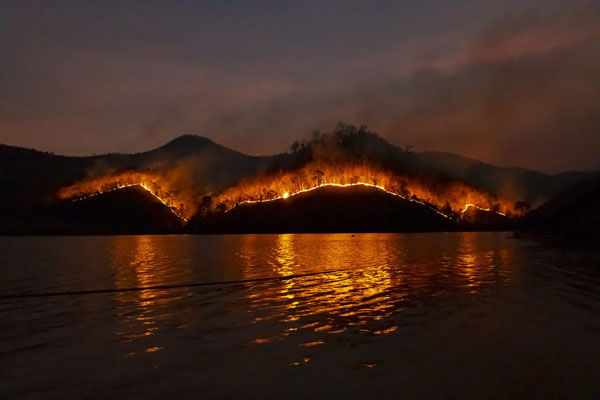Greece faces over 600 wildfires in July

[WIldfire, credit to Pixabay]
Over 600 fires have swept across Greece, scorching 400 square kilometers of land in July alone and forcing over 20,000 people to be evacuated.
This is a concern as the recent average land scorched by the wildfires was around 500 kilometers per year and officials are describing it as the largest-ever preventive fire evacuation in Greek history.
In Greece’s capital city, Athens, the mercury was expected to soar to 106 degrees, and up to 111 in central Greece according to the national weather forecaster EMY.
In a press conference, the Greek minister for climate crisis and civil protection, Vassilis Kikilias, stated ,“For the 12th day, under extreme conditions of heat and strong winds, we are lighting nonstop on dozens of forest fire fronts… The Greek Fire Service has battled more than 500 fires – more than a day”
He further added that the majority of these fires were ignited by human hand, either by criminal negligence or intentionally.
The blazes, fanned by rising temperatures and strong winds, have killed five people, destroyed homes, farms, and factories since July 17.
The Civil Protection authority issued warnings that the threat of further blazes was very high in almost every part of Greece.
According to the data gathered by Copernicus, the European Union’s climate change and earth observation service, Greece has had its highest wildfire carbon emissions in July ever recorded by a very large margin.
From the beginning of July to July 25, more than 1 megaton- or 1 million metric tons- of carbon has been emitted, which is roughly double the July emissions record set in 2007.
Wildfires emit carbon dioxide (CO2), a greenhouse gas that traps heat within the atmosphere, which is a major driver of climate change.
In their rescue efforts, the European Union (E.U) has sent 500 firefighters, 100 vehicles, and seven plans from ten member states, and countries like Turkey, Israel, and Egypt have been providing support by sending supplies.
It has been also found that at least eight other nations in the Mediterranean region have been affected by the recent wildfires, and the extremely hot summer temperatures topped over 40 degrees Celsius.
The impacts of deadly fires travelled to Algeria, leaving at least 34 casualties in residential areas and forcing mass evacuations.
Fortunately, a drop in temperatures and calmer winds helped firefighters get better control on the glazes in Greece and all the major fires were put out by Friday afternoon according to Greek Fire Service officials.
This also meant that conditions in other regions in the Mediterranean improved, allowing firefighters to contain wildfires along the Croatian coast and in Sicily, Italy.
Since the 1960s, Greece’s mean annual temperature has been rising, and in the last 20 years, its rate of warming has accelerated to overtake the world average.
The average annual temperature in Greece is predicted to continue rising all through the end of the century with seasonal and geographical variations.
The majority of regions in Greece recorded negative rainfall trends beginning in the second half of the 20th century, indicating that the areas experienced unusually high temperatures.

- Andy Kim / Grade 12
- Thomas Jefferson High School for Science and Technology

![THE HERALD STUDENT REPORTERS [US]](/assets/images/logo_student_us.png)
![THE HERALD STUDENT REPORTERS [Canada]](/assets/images/logo_student_ca.png)
